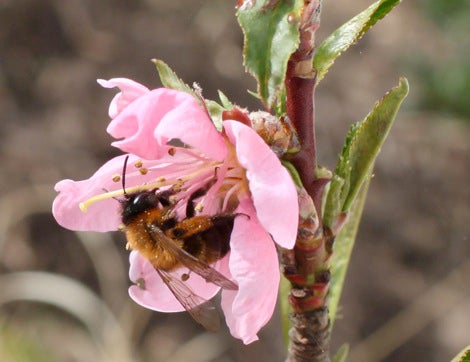
NCEAS Working Group Produces Study Showing How Vitamins and Minerals in Fruits and Vegetables Depend on Pollinators
Fruits and vegetables that provide the highest levels of some key vitamins and minerals to the human diet globally depend heavily on bees and other pollinating animals, according to a new study published in the international online journal PLoS ONE.
The new study, which came out of a working group at UC Santa Barbara's National Center for Ecological Analysis and Synthesis (NCEAS), was carried out by an international interdisciplinary research team, comprised of pollination ecologists and a nutrition expert, based at the Leuphana University of Lüneburg, Germany, the University of Berlin in Germany, the University of California, Berkeley and the University of California, San Francisco. The NCEAS working group was led by Claire Kremen, a conservation biologist at UC Berkeley.
The research team showed that, globally, "animal-pollinated crops contain the majority of the available dietary lipid, vitamin A, C, and E, and a large portion of the minerals calcium, fluoride, and iron worldwide. The yield increase attributable to animal-dependent pollination of these crops is significant and could have a potentially drastic effect on human nutrition if jeopardized."
More specifically, the team showed that in the global crop supply, several key vitamins and other nutrients related to lower risk for cancer and heart disease are present predominantly in crops propagated by pollinators. These include the carotenoids lycopene and ß-cryptoxanthin, which are found in brightly colored red, orange, and yellow fruits and vegetables. Other important antioxidants, including several forms of vitamin E and more than 90 percent of the available vitamin C, are provided by crops that are pollinated by bees and other animals.
Key minerals for the development of bones and teeth, including almost 50 percent of calcium and fluoride available in the global food supply, are present in crops produced with pollinators. Plant sources of calcium, such as sesame seeds, almonds or spinach, are particularly important in regions of the world where dairy production is often not culturally, environmentally, or financially feasible.
Bees and other animal pollinators are experiencing declines in many parts of the globe. Many farmers around the world depend on the European honeybee, importing them seasonally to pollinate their fields. However, the European honeybee has suffered massive overwintering losses, proposed causes of which include disease, pesticides and lack of nutritional (floral) resources. Wild pollinators that provide pollination services "for free" are also declining rapidly as habitat is destroyed by intensive farming practices such as agrochemical-based monoculture.
The results of this study demonstrate the potential impact of this pollinator decline on human health. The researchers estimate that up to 40 percent of some essential nutrients provided by fruits and vegetables could be lost without pollinators.
This study and NCEAS are supported by funding from the National Science Foundation.
† Top photo: Pollination is important for crops producing key nutrients for the human diet. Here a sand bee forages on a peach flower in a garden around Lüneburg, Germany.
Credit: AM Klein, Leuphana University of Lüneburg
Related Links



